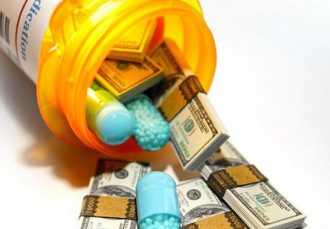Guest Writer for Wake Up World
If your doctor receives money or gifts from a drug company, be it payment for a lecture or a free meal, does it influence the medications he or she in turn prescribes? This represents the burning question in an industry saturated with pharmaceutical company involvement.
A ProPublica analysis revealed nearly nine in 10 cardiologists, and seven in 10 internists and family practitioners, included in their study received payments from drug or device companies in 2014.[1] But the analysis didn’t stop there.
It also looked into whether or not such payments were associated with prescribing practices, and here’s where things got interesting.
Doctors Who Received Drug-Company Money Prescribed More Brand-Name Drugs
ProPublica analyzed the prescribing habits of doctors who wrote at least 1,000 prescriptions in the Medicare Part D drug program. The doctors belonged to five common specialties: psychiatry, cardiovascular disease, family medicine, internal medicine and ophthalmology.
Not only was the receipt of drug-company money associated with a higher percentage of brand-name drug prescriptions, but the prescriptions rose with the amount of money received.[2]
The analysis included promotional speaking, consulting, business travel, meals, royalties and gifts as forms of drug company payments. Those who received more than $5,000 from industry in 2014 prescribed the most brand-name drugs. According to the analysis:
“In all cases, the group receiving larger payments had a higher brand-name prescribing rate on average.
Additionally, the type of payment made a difference: those who received meals alone from companies had a higher rate of brand-name prescribing than physicians who received no payments, and those who received speaking payments had a higher rate than those who received other types of payments.”
Are Drug-Company Payments ‘Thinly Veiled Kickbacks?’
Dr. Aaron Kesselheim, an associate professor of Medicine at Harvard Medical School, told The Atlantic regarding the featured study:[3]
“It again confirms the prevailing wisdom … that there is a relationship between payments and brand-name prescribing … This feeds into the ongoing conversation about the propriety of these sorts of relationships.
Hopefully we’re getting past the point where people will say, ‘Oh, there’s no evidence that these relationships change physicians’ prescribing practices.”
Indeed, this is far from the first time that such payments have been linked to prescribing practices.
A 2010 study published in the Archives of Internal Medicine also found that nearly 84 percent of physicians surveyed reported some type of relationship with industry during the previous year, and those with such a relationship were more likely to prescribe a brand-name drug even when a generic alternative was available.[4]
The finding isn’t only relevant for patients, who may be paying more unnecessarily for brand-name drugs, but also for taxpayers who spend billions each year subsidizing Medicare Part D. At least 1 in 4 U.S. prescriptions are paid for by Medicare.
Meanwhile, it’s worth repeating that the reason drug companies pay doctors and aggressively promote certain medications is not to benefit patients; it’s to benefit their bottom line. And there’s often a fine line between legitimate payments and illegal kickbacks. ProPublica noted:[5]
” … [F]ederal whistle-blower lawsuits against several pharmaceutical companies have alleged that payments are little more than thinly veiled kickbacks, which are illegal. Companies have paid billions of dollars to settle the cases.”
Drug Companies Heavily Promote ‘Me-Too Drugs’ to Doctors
Past research by ProPublica revealed the drugs most aggressively promoted to physicians, and they’re not medical breakthroughs or even, generally, top sellers.
Instead, they tend to be drugs that are newer to the market, sometimes underperforming and often face competition from other older, readily available drugs.
Dubbed “me-too” drugs, their makers may claim they carry fewer side effects, work faster or have other advantages over existing drugs on the market.[6]
Another ProPublica study revealed that top prescribers of some of the most heavily marketed drugs tended to receive promotional speaking payments from the drugs’ makers.[7]
Would You Still Trust Your Doctor If He or She Accepts Drug Company Payments?
In 2012, research showed that accepting gifts from the pharmaceutical industry does have implications for the doctor-patient relationship, and “doing so can undermine trust and affect patients’ intent to adhere to medical recommendations.”[8]
Not surprisingly, most people surveyed in one study said they would have less trust in their physician if they learned he or she accepted gifts worth more than $100 from the pharmaceutical industry, or went on industry-sponsored trips or sporting events.
One-quarter even said they would be less likely to take a prescribed medication “if their physician had recently accepted a gift in return for listening to a pharmaceutical representative’s presentation about that drug.”[9]
It’s no wonder that most physicians would rather their patients not know about any kickbacks they’ve received from the drug industry. But now that this has become public information, it may very well prompt some physicians to cut their ties to the industry.
Unfortunately, quite often — definitely too frequently for comfort — treatment recommendations are biased in favor of a specific drug simply because people making the decisions stand to profit from it.
If you find your doctor is receiving large amounts of money from industry, you may want to find another doctor or get a second opinion. At the very least, if you have concerns you might open a conversation about whether the drugs you’ve been prescribed are the best choices for you.
Whatever your health problem might be, I strongly recommend digging below the surface using all the resources available to you; including your own commonsense and reason, true independent experts’ advice and others’ experiences to determine what medical treatment or advice will be best for you.
You Can Find Out If Your Doctor Accepts Drug-Company Money (and How Much)
According to ProPublica’s “Dollar for Docs” website, which you can use to find out if your doctor accepts money from the drug industry, more than 1,500 companies have made payments to nearly 686,000 doctors, totaling close to $3.5 billion.[10]
You can also find out if your doctor receives payments from Big Pharma by visiting OpenPaymentsData.CMS.gov. This site has tallied nearly $6.5 billion in payments since 2013.[11] It hasn’t always been possible to find out what giftsyour own doctor might be accepting.
The Physician Payments Sunshine Act, which is part of the Affordable Care Act, went into effect in 2013. For the first time, the Act requires drug and medical device makers to collect and disclose any payments of more than $10 made to physicians and teaching hospitals.
The Centers for Medicare and Medicaid Services (CMS) is in charge of implementing the Sunshine Act, which it has done via its Open Payments Program. You can easily search the site to find out what (if any) payments your doctor has received, along with the nature of the payments.
Article Sources
[1] [3] The Atlantic March 21, 2016
[2] Propublica, Matching Industry Payments to Medicare Prescribing Patterns: An Analysis March 2016
[4] Arch Intern Med. 2010;170(20):1820-1826.
[5] [7] ProPublica June 25, 2013
[6] ProPublica January 7, 2015
[8][9] Fam Med. 2012 May;44(5):325-31.
[10] Pro Publica, Dollars for Docs
About the author:
 Born and raised in the inner city of Chicago, IL, Dr. Joseph Mercola is an osteopathic physician trained in both traditional and natural medicine. Board-certified in family medicine, Dr. Mercola served as the chairman of the family medicine department at St. Alexius Medical Center for five years, and in 2012 was granted fellowship status by the American College of Nutrition (ACN).
Born and raised in the inner city of Chicago, IL, Dr. Joseph Mercola is an osteopathic physician trained in both traditional and natural medicine. Board-certified in family medicine, Dr. Mercola served as the chairman of the family medicine department at St. Alexius Medical Center for five years, and in 2012 was granted fellowship status by the American College of Nutrition (ACN).
While in practice in the late 80s, Dr. Mercola realized the drugs he was prescribing to chronically ill patients were not working. By the early 90s, he began exploring the world of natural medicine, and soon changed the way he practiced medicine.
In 1997 Dr. Mercola founded www.Mercola.com, which is now routinely among the top 10 health sites on the internet. His passion is to transform the traditional medical paradigm in the United States. “The existing medical establishment is responsible for killing and permanently injuring millions of Americans… You want practical health solutions without the hype, and that’s what I offer.”
Visit www.Mercola.com for more information, or read Dr. Mercola’s full bio and résumé here.

If you've ever found value in our articles, we'd greatly appreciate your support by purchasing Mindful Meditation Techniques for Kids - A Practical Guide for Adults to Empower Kids with the Gift of Inner Peace and Resilience for Life.
In the spirit of mindfulness, we encourage you to choose the paperback version. Delve into its pages away from screen glare and notifications, allowing yourself to fully immerse in the transformative practices within. The physical book enriches the learning process and serves as a tangible commitment to mindfulness, easily shared among family and friends.
Over the past few years, Wake Up World has faced significant online censorship, impacting our financial ability to stay online. Instead of soliciting donations, we're exploring win-win solutions with our readers to remain financially viable. Moving into book publishing, we hope to secure ongoing funds to continue our mission. With over 8,500 articles published in the past 13 years, we are committed to keeping our content free and accessible to everyone, without resorting to a paywall.







